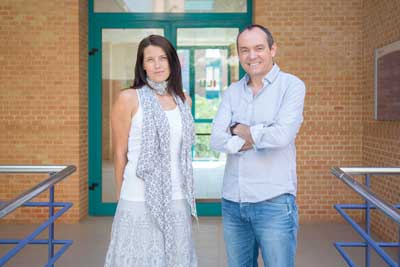| Sep 11, 2018 |
Study lays foundations for future medicine design
|
|
(Nanowerk News) A study by the Computational Biochemistry Research Group of the Universitat Jaume I (UJI) of Castellón, Spain, shows that enzyme activity depends on electrostatic properties, as opposed to mechanical ones. The scientists believe this result opens up new possibilities for the use of the enzymes in fields such as biomedicine for designing new medicines, or in biotechnology for the development of artificial enzymes for industrial processes that are more environmentally friendly.
|
|
Results of this research have been published in the Journal of the American Chemical Society - as well as being featured on the front page ("Insights on the origin of catalysis on glycine N-methyltransferase from computational modelling").
|
|
Data obtained with computational simulations by the research group headed by Physical Chemistry professor Vicent Moliner coincide with experimental data obtained in other research groups in the United States, but have a different interpretation.
|
|
“The study has allowed us to describe, on a molecular level, the activity of the important enzyme glycine N-methyltransferase, which is linked to degenerative processes such as dementia or Alzheimer’s disease. The enzyme creates a localised electrical field which accelerates the chemical reactions that take place within living beings,” explains Moliner.
|
 |
| Researchers Katarzyna Swiderek and Vicent Moliner.
|
|
“Understanding the basic principles of how enzymes work allows us to not only comprehend how living organisms function, but also to understand in depth the mechanism by which many diseases deteriorate or destroy them,” says UJI group researcher Katarzyna Swiderek.
|
|
As well as being highlighted in the Journal of the American Chemistry Society and being chosen as the ‘spotlight’ piece by the editors, their research has received recognition by the Biophysics Society of Spain, being chosen as the article of the month in Biofísica Magazine.
|
|
Furthermore, the study headed by Moliner has been added to the F1000 website, where academicians of renown prestige nominate the most impactful articles on an international level.
|
|
Vicent Moliner is a professor of Physical Chemistry at the Universitat Jaume I and the head researcher of the Computational Biochemistry Group. Doctor Katarzyna Swiderek is a researcher for the same group thanks to a Juan de la Cierva contract – an addition on behalf of the National Department of Science, Innovation and Universities. The group is dedicated to the development and implementation of theoretical models for the study of biological processes through simulations with highly advanced computers.
|

